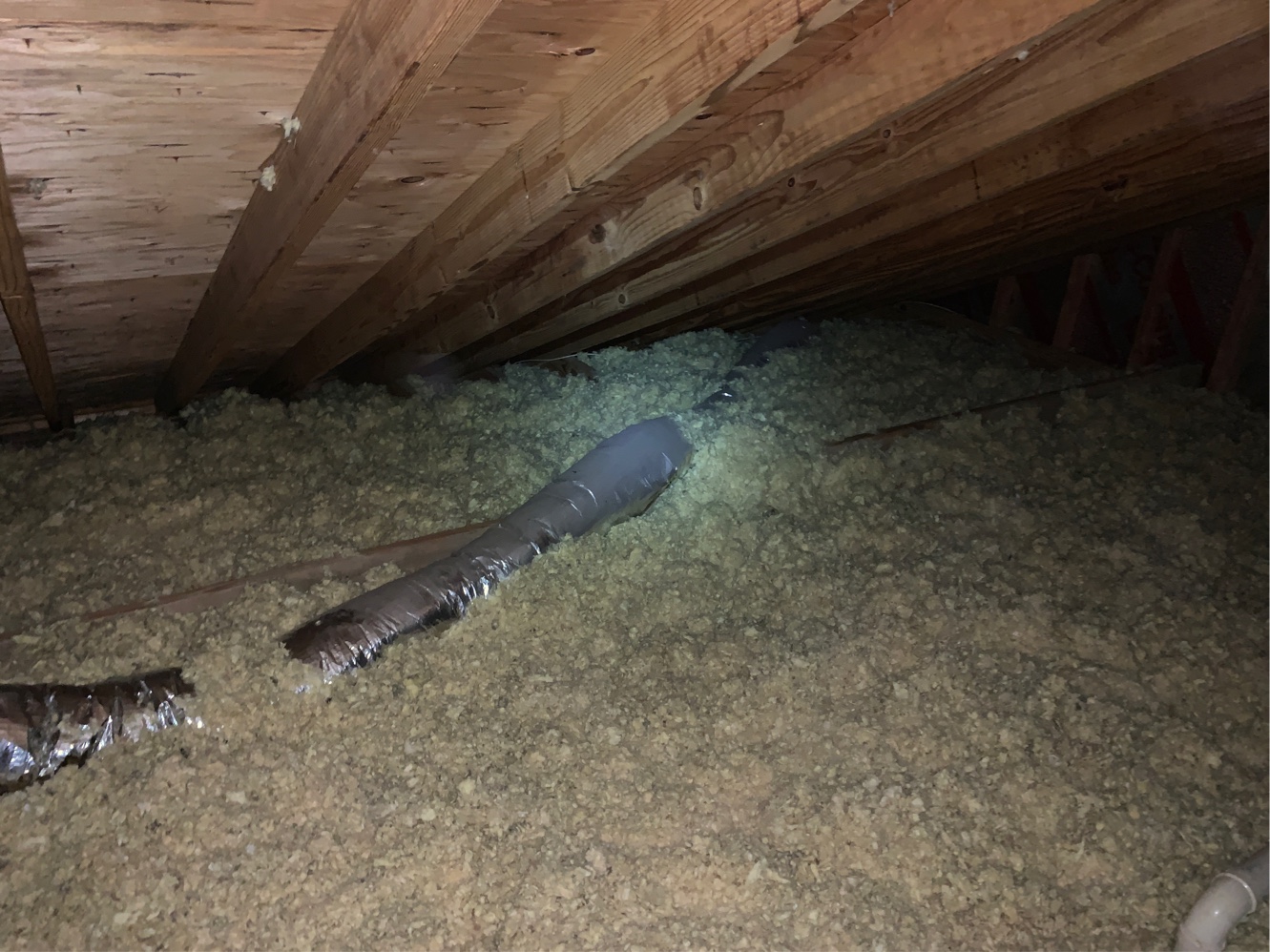
Cellulose Insulation
Cellulose insulation is a commonly used type of insulation made up of about 85% recycled paper. While it has its advantages, there are some factors to consider before choosing cellulose insulation for your home.
One concern with cellulose insulation is its potential for dustiness. During installation or if disturbed, cellulose fibers can become airborne and contribute to an extremely dusty environment. This can be particularly troublesome for individuals with respiratory sensitivities or allergies. While proper installation techniques can help minimize dust generation, it is much dustier than fiberglass. After all, whatever is floating around your attic will inevitably work its way into your ductwork and home.
Another drawback of cellulose insulation is its susceptibility to mold growth. Cellulose, being an organic material, can itself be a food source for mold if it becomes wet or exposed to high humidity levels. This can be a concern, especially in areas with moisture issues or in climates prone to high humidity. Poorly ventilated attics in Nashville, which we are in daily, are prime examples. To mitigate this risk, cellulose insulation manufacturers often treat the fibers with chemical additives, such as borates. However, it is crucial to ensure that proper moisture control measures are in place to prevent mold growth within the insulation.
Additionally, over time, cellulose insulation may settle more compared to other insulation materials. This settling can lead to a decrease in its thermal performance, as gaps or voids may form within the insulation layers. In our experience maintenance may be more necessary than fiberglass alternatives to address any settling issues and maintain the desired insulation levels.
If you’ve dealt with pests or rodents in your attic, you likely were recommended cellulose insulation by your pest control or animal removal companies. This is due to its treatment with boric acid, which acts as a deterrent for rodents settling long term. Our view is that this is essentially a band-aid giving homeowners a false sense of security. Finding the entry point and sealing the home up from outside pests should be the priority. If this is accomplished then the type of insulation shouldn't be of concern.
Considering these factors, it's important to weigh the pros and cons of cellulose insulation before making a decision. While cellulose insulation is an environmentally friendly option made from recycled materials, its potential for dustiness, mold susceptibility, and settling should be taken into account.
After dealing with people that have been diagnosed with severe mold related illnesses, we do not believe cellulose is worth the risk. Any time moisture problems arise in your attic, potential for health issues come along too. It’s our opinion that in middle Tennessee it’s simply too humid to risk insulating your attic with a mold food source like cellulose. We used to recommend just installing new insulation over old, depleted cellulose but have since changed our stance. When a family friend from a nearby state was dealing with sever health issues, a very thorough and expensive whole home inspector diagnosed their 1970’s cellulose as the source. Their quote for removing it, replacing all ductwork throughout the home and getting that home to be guaranteed safe environment was well into the six figures.
We will install cellulose if you insist, but for many reasons stated here, we advise against. Fiberglass is a cheaper and cleaner to install alternative. We only use GreenGuard Gold Certified products that are made much cleaner than decades ago and are almost dust free.
To learn more about different insulation options and their suitability for your home in Nashville, Franklin, Brentwood, Murfreesboro, Mt. Juliet, Lebanon, Spring Hill, Columbia, Hendersonville, or other surrounding neighborhoods, you can visit koalainsulation.com/nashville. We can provide detailed information and guidance to help you select the right insulation solution for your needs.
Ready to book your free insulation evaluation?
We have 3 convienant ways for you to get in touch
We Provide Insulation Services to the Following Nashville Areas
Hermitage, Madison, Mount Juliet, Old Hickory, Nashville, Whites Creek, Lascassas, Murfreesboro, Rockvale, Antioch, La Vergne, Nolensville, Smyrna, Arrington, Brentwood, College Grove, Eagleville, Franklin, Thompsons Station
Counties Served
Davidson County, Wilson County, Rutherford County, Williamson County
Zip Code
37085, 37127, 37128, 37129, 37130, 37153, 37204, 37205, 37211, 37215, 37217, 37220, 37221, 37189, 37201, 37203, 37206, 37207, 37208, 37209, 37210, 37212, 37213, 37218, 37219, 37228, 37232, 37234, 37240, 37243, 37246, 37076, 37115, 37122, 37138, 37214, 37216, 37014, 37027, 37046, 37060, 37064, 37067, 37069, 37179, 37013, 37086, 37089, 37135, 37167

